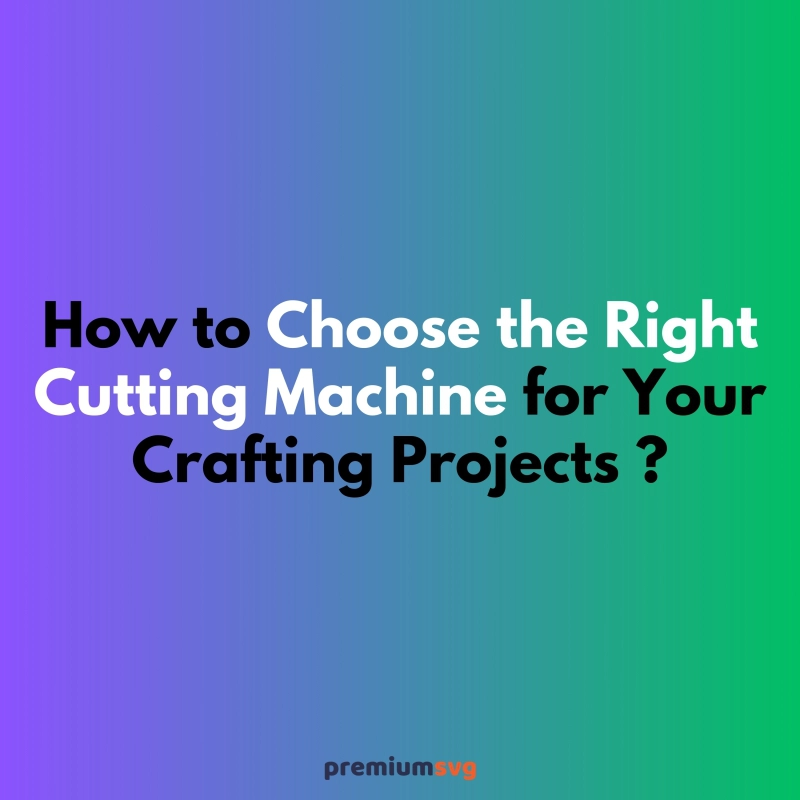How to Choose the Right Cutting Machine for Your Crafting Projects
It is like trying to find the needle in the haystack-just about everything else seems to be a cutting machine. There are so many options that one can easily get overwhelmed. Be it a hobby, the start of a small business, or just the pleasure of making gifts with a personal touch, the right machine will definitely make all the difference. Let's break it down step by step and help you find the best fit for your needs.
What is a cutting machine?
A cutting machine is an electronic device that cuts paper, vinyl, fabric, or wood in specific shapes or designs. It's generally used for crafting, scrapbooking, and DIY projects. Popular models include Cricut, Silhouette, and Brother ScanNCut.
Learn more about "What is a cutting machine?"
How do cutting machine works?
Cutting machines work by using a motorized blade or laser to cut materials like paper, vinyl, fabric, or wood into specific shapes or designs. Users load a digital design into the machine's software, which then guides the machine to cut the material precisely according to the design. Some machines use interchangeable blades or tools for different materials, offering versatility for various crafting projects.
Learn more about "How do cutting machines work?"
1. Consider Your Crafting Needs
First things -what are you planning to make? Think custom t-shirts, stunning paper crafts, or detailed fabric projects. Knowing what you want to work with most will point you toward the right machine.
Pro Tip: If you want flexibility for various materials, choose a machine with variable settings and multiple tool options.
2. Manual versus Digital Cutting Machines
Generally, cutting machines come in two main categories: manual and digital. Each has its strengths, so it all depends on your crafting style.
Manual Cutting Machines: These are hand-cranked tools, great for those just starting out and projects that are not too large. They work great for quick cuts, scrapbook designs, and simple shapes.
Digital Cutting Machines: These are software-driven and are very good for complex designs down to the smallest detail. They are great for more tech-savvy crafters and larger, more intricate projects.
Pro Tip: If precision and ease of use are key considerations, a digital machine may be your better option.
Learn more about "Types of Cutting Machines."
3. Check Material Compatibility
Not all cutting machines can cut all types of materials. Some are ideal for vinyl and paper, while others can work on leather, fabric, or even thin sheets of wood. In buying, always refer to the material compatibility chart.
Pro Tip: If your primary need is cutting fabrics or thicker materials, then choose a machine with rotary blades to get clean cuts.
4. Explore the Software and Design Tools
But for digital machines, software will be as important as the hardware. Programs like Cricut Design Space and Silhouette Studio allow you to design and edit your artwork. Pick the software that makes sense and is easy to understand.
Pro Tip: Some machines allow you to import your own designs for an unlimited number of creative applications.
5. Set Your Budget
Cutting machines vary widely in price, and it’s not just about the initial cost. You’ll also need to consider expenses for extra blades, mats, tools, and materials. Investing in a reliable machine can save money in the long run.
Pro Tip: Start with essential accessories and gradually build your toolkit as your projects grow.
Frequently Asked Questions (FAQs)
What’s the best cutting machine for beginners?
For example, manual machines like the Sizzix Big Shot work great for beginners. For digital, one of the best is the Cricut Explore Air 2.
Can one cutting machine cut every material?
Absolutely not! Some machines shine with fabrics, while others work best with vinyls and papers. Always check the specifications in your machine.
Am I required to be some kind of techie to use a digital cutting machine?
Not at all! Most digital machines come with user-friendly software and tutorials to guide you.
Final Thoughts
Choosing the right cutting machine isn’t about picking the most expensive option—it’s about finding the one that fits your needs and crafting style. Whether you’re crafting for fun or starting a business, the right tool will make every project smoother and more enjoyable. Take your time, do your research, and most importantly—have fun creating!
Next page: Essential Tools and Accessories for Cutting Machine Projects



Comments
No Comments